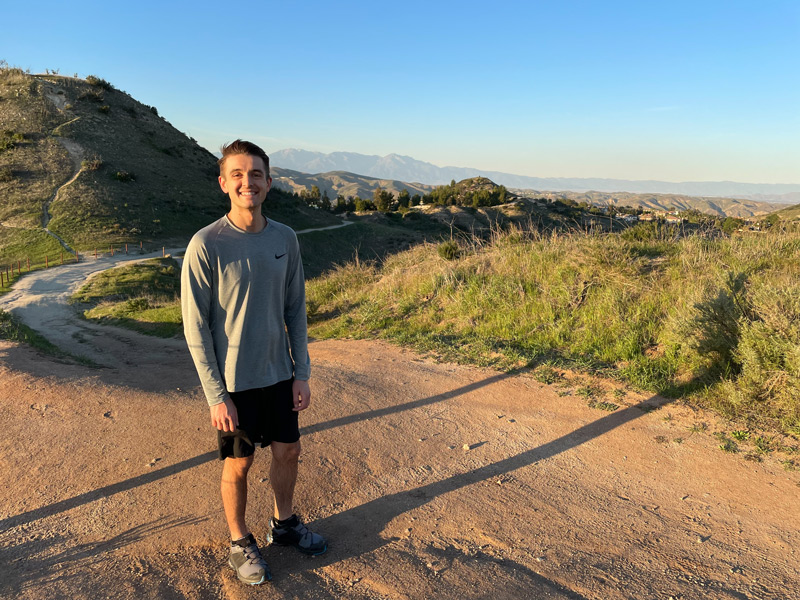 Jordan Burke is an amazing 29-year-old from a very loving family. He built a fine career and wed the love of his life, Mariah. Jordan has always enjoyed being active, and at 6 feet, 1 inch and 165 pounds, he has been an avid outdoorsman and led a healthy lifestyle along with his wife.
Jordan Burke is an amazing 29-year-old from a very loving family. He built a fine career and wed the love of his life, Mariah. Jordan has always enjoyed being active, and at 6 feet, 1 inch and 165 pounds, he has been an avid outdoorsman and led a healthy lifestyle along with his wife.
In 2021, Jordan started feeling a squeezing pressure near his heart whenever he ran, swam, or caught a wave while surfing. He was only 28 at the time.
“These pains only happened when I exercised, so when I was at rest, or even doing other things, normal things, I didn’t feel it,” Jordan said.
The pain prompted him to visit a few different doctors. Due to Jordan's young age, it's improbable, but not impossible for someone so young to have heart-related issues that aren't congenital. His case was an anomaly, as someone of his age and fitness was not the typical case for heart-related issues.
In September 2021, while Jordan and his wife were on vacation celebrating their five-year wedding anniversary, he experienced several chest pangs while exercising and surfing.
“At the time, it seemed manageable … not enough to make me very worried, especially since I had gotten it checked out previously,” Jordan recalled, adding it felt more like something was just “off.”
Jordan’s mother Rachael Burke is the cardiovascular service line manager at MemorialCare Saddleback Medical Center. After hearing that her son was continuing to experience chest pain, she recommended he visit Ronald Gim, M.D., subsection chief of cardiology at MemorialCare Saddleback Medical Center.
On Oct. 29, 2021, Jordan was scheduled for a stress-echo. When the results did not seem to rule out coronary artery disease, he was advised to report to the emergency room at Saddleback Medical Center to arrange an urgent coronary CT angiogram.
“I was concerned about the abnormalities Jordan demonstrated on his stress test and I wanted to know, with certainty, that he was not at risk,” said Dr. Gim.
The CT scan was performed with Saddleback Medical Center’s new Revolution Apex™, which provides an anatomic assessment of coronary arteries. Kari Nelson, M.D. saw that the results confirmed critical blockages of many coronary arteries. Jordan was then taken to the catheterization lab, where an angiogram was performed by Dr. Gim to view the blood flow through his heart.
“The angiogram revealed critical disease of his left main coronary artery and I felt that we caught this in the nick of time,” said Dr. Gim. “Jordan’s best option was for bypass and he was placed on a balloon pump, a device to promote blood flow through severe blockages, for support.”
Jordan signed an advance directive before going into surgery, which stated that he did not wish to accept blood during the operation since he is one of Jehovah’s Witnesses.
The surgery team was led by Jeffrey Altshuler, M.D., medical director, cardiovascular surgery, MemorialCare Heart & Vascular Institute, Saddleback Medical Center, and included an assistant surgeon and anesthesiologist Alexander Chang, M.D., who also accommodated Jordan’s request to not receive blood. The operating room team also included physicians’ assistants, scrub technicians, nurses, and perfusionists who ran the heart-lung machine.
The quintuple bypass surgery took three and a half hours and was a success. At 29-years-old, Jordan was the youngest MemorialCare Saddleback Medical Center patient to have undergone a quintuple bypass.
“The fact that we can do a surgery that is complicated, and unplanned, without having to use blood, well that speaks to the skill level of our cardiac team at Saddleback, Rachael said of the team that performed the surgery on her son.
After the surgery, Jordan stayed in the hospital’s intensive care unit for a few days to recover. During that time, many hospital staff members stopped by to check on him.
“The hospital staff was amazing,” Jordan said. “It seemed like almost all the doctors and nurses who worked on my case had come by to visit and see how I was doing.”
Family History
On Jordan’s father’s side, there is a history of heart disease. Rachael said Jordan’s father had a stent placed in his heart two years ago, and unfortunately passed away from advanced Parkinson’s disease.
And, his paternal grandfather had open heart surgery and two valves replaced at 47.
“Honestly, knowing what I know from being an ER nurse, (Jordan) would have been a statistic. He is the patient we see that has a catastrophic cardiac event, with little chance of recovery,” Rachael said of her son if had he not gone to the ER when he did.
Post-Surgery
Jordan was discharged from Saddleback Medical Center on November 2. After coming home, he got a lot of rest, and eventually, started taking small walks. Currently, he has a bit of numbness and soreness in his chest, but has been able to start running and surfing again.
As soon as I was able to get my heart rate up again, I didn’t feel (the squeezing) which is an incredible feeling. You don’t appreciate things like that until it becomes a problem. I’m so thankful to that whole team, and the hospital for everything they did to find (the problem) and take care of it.
Jordan Burke
Dr. Altshuler said while Jordan will need to continue to watch his diet and cholesterol, he should be able to go about living a normal and active life.
“He’s doing great and I don’t think any of us could be more grateful,” said Rachael.